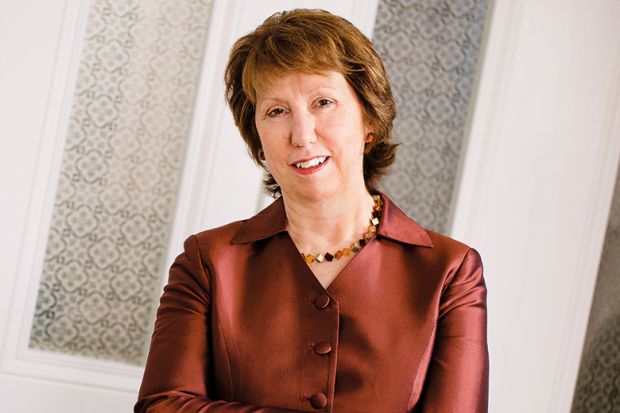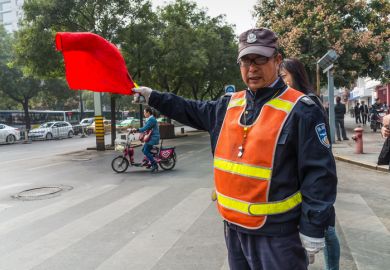Baroness Ashton of Upholland is a Labour Party peer and politician. In 1999, she was made a life peer by Tony Blair and served as a parliamentary under-secretary of state until being appointed leader of the House of Lords by Gordon Brown in 2007. In 2008, Lady Ashton was appointed trade commissioner for the European Union, which in turn led to her becoming high representative for foreign policy and first vice-president of the European Commission. In January, she took up her role as the University of Warwick’s first-ever female chancellor.
Where and when were you born?
I was born in 1956 in Upholland, a small village in rural Lancashire, close to Wigan.
How has this shaped you?
The major industries in the area had been coal mining and farming, and my family had long been involved in both. I saw poverty at close quarters – in my village school class of 49 children, there were several whose families were extremely poor. My parents were ahead of their time in supporting gender equality: they were determined that I should become the first woman in their families to go to university.
What do you want to achieve during your chancellorship of the University of Warwick?
First, do nothing to disrupt the smooth functioning of one of Britain’s best universities. Beyond that, we have big international challenges and opportunities: good universities are no longer simply regional or even national institutions. Navigating the impact of Brexit will be important over the next five to 10 years. Further afield, I want to support Warwick’s international ambitions: we will soon have a significant academic presence in California which aims to expand to be a campus supporting about 6,000 students by 2031. The potential is huge for this kind of expansion and cross-fertilisation.
What has changed most in higher education in the past five to 10 years?
Plainly the changes to the system of loans and tuition fees have had a big impact. This has made students keener to obtain value for money; they are rightly putting universities on their mettle. The overall data suggest that poorer sixth-formers are not being deterred from applying to university; but neither has there been a decline in the historic inequalities in the rate of applications from the daughters and sons of families from different social backgrounds. We need to do more to put this right.
If you were the higher education minister for a day, what policy would you immediately introduce to the sector?
Learn from the lessons from other countries such as the US to identify, in Years 7-10, talented children who might benefit from a university education but are currently deterred for a variety of reasons. They need support and encouragement in their middle-teen years, not just in the sixth form. This is not just a moral issue: it should be an economic priority. As a nation we need the talents of all.
What personal qualities make for a successful political career, and are these qualities the same today as they were 20 years ago?
It depends on what you mean by success! When I was a new minister, a friend in the Cabinet reminded me of a dictum that has been variously attributed to Harry Truman, [the journalist] William T. Arnold and Ronald Reagan: “There is no limit to what you can achieve, if you are prepared to let others take the credit." It’s not always easy to put into practice: a desire for recognition is a very human trait, and not to be ignored. But it’s seldom a bad idea to remember that, in almost all circumstances outside competitive sport and presidential elections, the task matters more than the ego. I am not sure that basic truth has changed in the past 200 years, let alone the past 20.
Which forgotten figure in history should everybody know about?
I should like to see not just one, but a group of women whose contribution to science has been largely ignored – such as Mary Anning, who could claim to have discovered dinosaurs; Ada Lovelace, whose pioneering 19th-century work helped later generations to develop computers; and, of course, Rosalind Franklin, whose contribution to our understanding of DNA has still not been fully recognised. Perhaps if girls grew up knowing their stories – and there are many other women who could be added to that list – more would seek to become scientists, engineers and mathematicians. Once again, this is both a moral and an economic imperative.
What lessons from history are important to remember today?
Like Barack Obama, I am drawn to Martin Luther King’s words: “The arc of the moral universe is long but it bends towards justice." (Obama said “history” rather than "moral universe", but his point is much the same.) The work of expanding justice, tolerance, equality and opportunity for all is arduous and never-ending. But, in the long run, it goes with the grain of history. As we know all too well – and the horrors of the 20th century remind us, if we are ever tempted to lapse into complacency – there can be big and terrible setbacks. But our determination to do better should be allied to a basic optimism that we can succeed.
What advice would you give to your younger self?
To keep the good friends you make through life. To take different opportunities when they present themselves. To learn from as many people as possible on the way. And try to keep up to date with technology!
hilary.lamb@timeshighereducation.com
Appointments
Joanna Newman has taken up her position as secretary general of the Association of Commonwealth Universities, the world’s first and oldest international university network. Dr Newman, who was previously vice-principal (international) at King’s College London, began her role on 3 April. She has more than 18 years’ experience in the sector, having served in numerous roles such as director of the UK Higher Education International Unit (now Universities UK International) and head of higher education at the British Library. “I am honoured to take the helm of such a longstanding and prestigious organisation as the ACU,” she said.
Andrew Thompson has been appointed chief executive of the Arts and Humanities Research Council, after a term as interim CEO. As part of his new position, Professor Thompson will become the first executive chair of the AHRC upon the creation of UK Research and Innovation. He was previously director of the Centre for Global and Imperial History at the University of Exeter, and dean of the Faculty of Arts at the University of Leeds. He said that the perspectives of arts and humanities researchers were now needed “more than ever” and that scholars supported by the AHRC had “a vital role to play in providing challenging thinking”.
Jane Burridge, head of the neurorehabilitation research group at the University of Southampton, has been elected president of the Association of Chartered Physiotherapists in Neurology.
The Political Studies Association has named Phil Sooben as its new chief executive officer. He is currently deputy chief executive of the Economic and Social Research Council.
Steve Goldstein has been appointed dean of the Stritch School of Medicine at Loyola University Chicago. Previously, he was professor of biochemistry, provost and senior vice-president for academic affairs at Brandeis University in Massachusetts.




